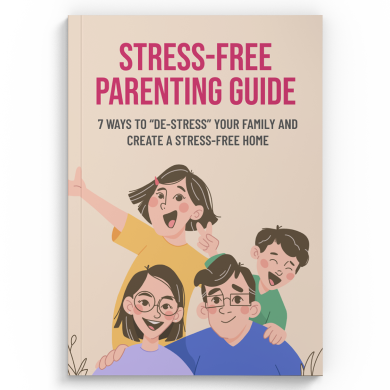While raising children, every parent hopes for a quick fix to conflicts, moods, and tantrums. They wish to always know the right words and actions to calm their child’s upset behaviour and avoid resulting drama.
Parents wish this method would work every time, without fail.
They hope for it to work when their child is tired, hungry, and annoyed. They want it to work even when they’re outside, in an unfamiliar place, among unknown people. It should work even when the parents aren’t feeling their best, patient, or understanding.
While living without such stress is an appealing thought, it might not be achievable.
1. There are no one-size-fits-all answers for different situations. Conditions vary, children vary, and your reactions vary. We’re not robots who record and replay. We are human beings.
Even if you repeat the words I teach you, word by word, your expression and tone can bring about a totally different result than you expected.
2. This type of permissive parenting simply can’t always work.
Even if you repeat the words I teach you, word by word, your expression and tone can bring about a totally different result than you expected.
This type of parenting approach simply can’t always work.
Please be very cautious and mindful because the peace, obedience, and calmness you get might come at a steep cost.
Even if you repeat the words I teach you, word by word, your expression and tone can bring about a totally different result than you expected.
This type of parenting approach simply can’t always work.
Please be very cautious and mindful because the peace, obedience, and calmness you get might come at a steep cost.
Raising children is a nuanced journey, and the no-drama parenting often fails to acknowledge the root cause of challenging behaviour.

Alright, let’s talk about the notion of “drama-free” parenting in the context of raising children. It seems to suggest that any sort of challenging behaviour is unnecessary and unwarranted – that kids throw tantrums without any real reason.
But the reality is not quite that black and white.
Blow-ups and conflicts are all part of a child’s growth and development. These are the stages when kids are learning to cope with life and the world around them. They’re figuring out how to handle big emotions and communicate with others. And let me tell you, mastering these skills is not a walk in the park – it doesn’t happen quickly and, well, without some “drama”.
Interestingly, some adults don’t even have the emotional regulation they expect from their kids. So, labelling these learning periods as “drama” – it sends a message that it’s something extremely unwanted, unattractive, and unacceptable. Yeah, it’s not always pleasant, I get it, but it’s not a reason for shame, disgust, or anger.
There are parents who manage to prevent the majority of conflicts and outbursts through:
- Strict rules;
- Predictability;
- Consistency.
These parents have clear expectations and consequences for not meeting these expectations. They’ve set the stage and the children know what’s expected of them.
However, some parents claim to have found the secret to drama-free parenting.
In my experience, there are typically three types of parents.
Types of parents who seem to excel in “drama-free” parenting
- The first type we’ve got are the so-called “cool parents”. These parents often describe themselves as relaxed and confident when it comes to raising children. They’ve got effective strategies ready to deploy, they’re really good at the parenting thing, and they can handle a lot.
- The second type is what I’d call “phlegmatic parents”. These are the parents who are emotionally distant and operate primarily on reason in their lives. They interpret everything through the lens of logic and make decisions based on what they consider to be rational principles.
- Then, there’s the third type, which I’ve dubbed “cling wrap parents”. They are emotionally incredibly warm and loving, but they smother their children with their love, techniques, and constant constraints. They’re always wrapped around their kids, like cling wrap, sticking, squeezing, and never letting go.
These three types of parents usually claim that they’ve mastered the art of “drama-free parenting”. They say they calmly handle all challenges and that their children don’t have uncontrollable outbursts or embarrassing behaviours.
To some extent, I agree with them.
But I’ve noticed that the absence of drama comes at a high price.
Let me explain why I think so.
“Drama-free” parenting with “cool parents” who have everything “under control”
When I observe these so-called “cool parents”, I admit, I’m always waiting for the moment they’ll snap. At some point, the consistency, “coolness,” and patience will inevitably fade away.
They function brilliantly, but then they lose it completely at some point. They’re the parents who operate flawlessly for a long time but eventually become unpredictable.
I once observed a father who demonstrated an incredible amount of patience with his child. Then, at one point, he abruptly grabbed the kid and spanked him several times, maybe more.
This wasn’t mild discipline.
The goal wasn’t to stop the child, to let him know that he had crossed a line. No, the aim was to vent his anger on a child who was not following him. The father had converted his helplessness into physical strength and punished the child physically.
The “cool parents,” who are so consistent and precise, is that “drama-free” parenting?
No, it’s a pressure cooker waiting to explode. It’s a guise of pretending there’s no drama because they’ve been able to handle it successfully until now.
But one day, they find themselves in a situation they can’t handle. The drama happens. The child doesn’t give in. Nothing works. And then, instead of accepting this, they simply lose control.
That’s when I receive their emails, two pages long, without a single typo or misspelt word.
What does this mean?
It means that these are parents who strive for perfection and function in that way themselves.
Of course, they also put immense pressure on their children to perform and achieve the same. Perfect. Impossible.
Their children often display neurotic behaviours, ticks, biting nails, pulling out hair, nose-picking, and thumb-sucking long past the socially acceptable age, among other things.
There’s a lot of unrest and poor self-esteem among these children. The overly demanding parents have expectations that their children can never meet.
Such parents, who are never satisfied, often hold family meetings and have lots of discussions.
But the child often doesn’t gain any benefit from these conversations.
The child gets demands, conditions, further instructions, expectations, and corrections. Maybe a temporary “Yes, yes, you’re good …” followed by a damaging addition of “BUT”.
From the outside, raising children using this method might seem drama-free, and the parents might appear as dedicated and conscientious. But inside their child, a storm is brewing, which will sooner or later break out with thunder and lightning.

“Drama-free” parenting with “phlegmatic parents”
These are the parents so cold it’s crystal clear that a child can’t thrive in such an environment.
Everything is done rationally, as the Germans would say “Ordnung und Disziplin” – it has to be this way, it will be this way, and there’s no other way.
You know the phrase, “If it’s not my way, it’s no way”.
What about their kids? Do they create drama? No, they really don’t.
These are broken kids, children without backbone, who never know if they’ll live up to expectations or if they’re doing the right thing, and all these doubts and fears push them into total passivity.
They may seem calm and obedient, but they actually don’t feel safe even in their own home. They never know when one of the parents will explode, blaming them for not doing something the right way and at the right time.
“Why this, why that”… Let me tell you why: because they’re still kids! They won’t be perfect, no one is. With such pressure, you’ll just break them, and they simply won’t be able to function.
Work habits, accuracy, and similar things in children are achieved in different, non-violent, and emotionally harmless ways.
So that your child follows and obeys you because they respect you, because you’re their role model and because you’re connected and have a genuine, loving relationship. “Phlegmatic parents” and their children certainly don’t have such a family life.
They’ve gotten rid of the drama but at an extremely high cost.

“Drama-free” parenting with “cling-film parents”
These are the parents overflowing with love. Often, I hear them talking about mindfulness, the importance of being attentive to their kids, and so on.
They completely envelop their children, suffocating their independence. Just like cling-film – tight!
These kids never truly come alive. I’ve observed them at camps and noticed that, on average, they need to be separated from their parents for about four days to function normally. And the last night of the camp? You can bet there will be a wet bed.
Why? Because they know they’re going back to a home environment that, while brimming with love, is suffocating!
It’s like observing a young couple, besotted with each other. But six months in, you see one still in the throes of passion, and the other is totally over it. The infatuation phase has passed and everything becomes so stifling, annoying, and excessive that they can’t function. They break up.
It’s the same with smothered kids – they simply don’t develop, they don’t have room to. No time, no freedom, no adventure. They sever the relationship with their parents when they’re fed up, either by moving out when they’re older or emotionally withdrawing when they’re younger.

So, does a “drama-free” parenting approach make sense at all?
The thing is, if we want a life without drama, where nothing particularly eventful happens, we might be able to achieve it.
The real question is, at what cost?
We expect children to learn how to manage their intense emotions, yet we often deny them the opportunity to express themselves.
“Polyvinyl parents” might say: “We teach them to express their anger”.
They expect the child to say, “Yes, Mommy, I’m angry at my brother because he stole your lap,” or “because he took my toy” or “because he’s always crying”. And then what?
More talks, plan-making, and explanations follow, but the child never gets to express their anger. There may be no drama on the surface, but it keeps happening inside the child. That’s not the solution.
So, what is right? What to do when drama arises?
Firstly, we don’t just rely on the child being able to identify, process, and verbalise their issues. We observe what is going on inside the child, what is happening, and how much they are affected by certain situations. This way, at least they can predict where the greatest potential for drama lies.
When it happens, when their behaviour really crosses the line, we stop it. After we’ve stopped it, we help them find other, alternative, more adaptable behaviours and PRACTISE.
Yes, practice. Just like playing the violin. And just as they won’t become a master at playing the violin in one hour, they also won’t become a master of their emotions after one conversation. Not even after two or three conversations.
Progress will require effort and commitment, and initial results will become evident. However, it won’t be flawless right away. Just like with the violin, practice leads to mastery.
After all, we learn this throughout our lives. There are many adults who have never learned this well. They express their emotions in painfully destructive ways, hurting everyone around them.
So believe me when I tell you: A little bit of drama is necessary!
Experiencing a mix of calm days and chaotic moments is an integral part of parenting. It’s these variations that make us appreciate the contrast between the ordinary and the extraordinary.
We all have those uneventful days when everything seems fine, and then there are those unforgettable occasions when the house turns into a circus. It’s during these lively moments that we create lasting memories and experience the catharsis that parents often talk about.
Imagine this, your child comes running to you, saying sorry with all their heart and expressing their love for you without holding back. These heartfelt moments create memories that stay with us forever. And it’s the touch of drama that makes these connections even more powerful, strengthening our bond in profound ways.
Embrace the drama, cherish the connections, and treasure the journey of raising extraordinary beings.
May your bond with your children grow stronger with each day.
Kind regards,
Marko Juhant




